The Story of Wong Kim Ark 黃金德
A story that highlights the greatness of a flawed America deserves to be known to every American citizen, and every Chinese who lives in Wong’s parents motherland now
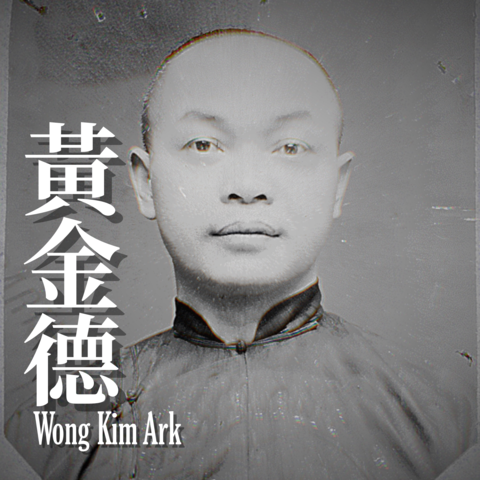
Context
Recently, President Trump’s has signed executive order, titled “Protecting The Meaning And Value Of American Citizenship,” aims to revoke birthright citizenship for anyone born on American soil, regardless of their biological parents’ immigration status. For instance, if a child is born to parents who have legally or illegally entered the United States, as long as one parent has not acquired lawful permanent resident status or US citizenship, the child will not automatically be granted US citizenship, which is a fundamental right rooted in the 14th Amendment. This could for sure impact parents who come to the US for birth tourism, which is a loophole I admit and agree with. Especially, after watching Leslie Tai’s How to Have an American Baby.
In this blog post, we will focus on unconditional “right of soil” i.e. US’s current policy.So, as a nerd, this piqued my interest in delving deep into the history of the 14th Amendment. To my surprise, it’s connected to an American-born Chinese American with Taishanese roots named Wong Kim Ark 黃金德.
Birthright Citizenship 101
The idea behind birthright citizenship - often referred to as “jus soli”, meaning “right of the soil”, such principle developed under English common law could be dated back to 1608. Till now, pretty much over 30 nations mainly in America are following this principle.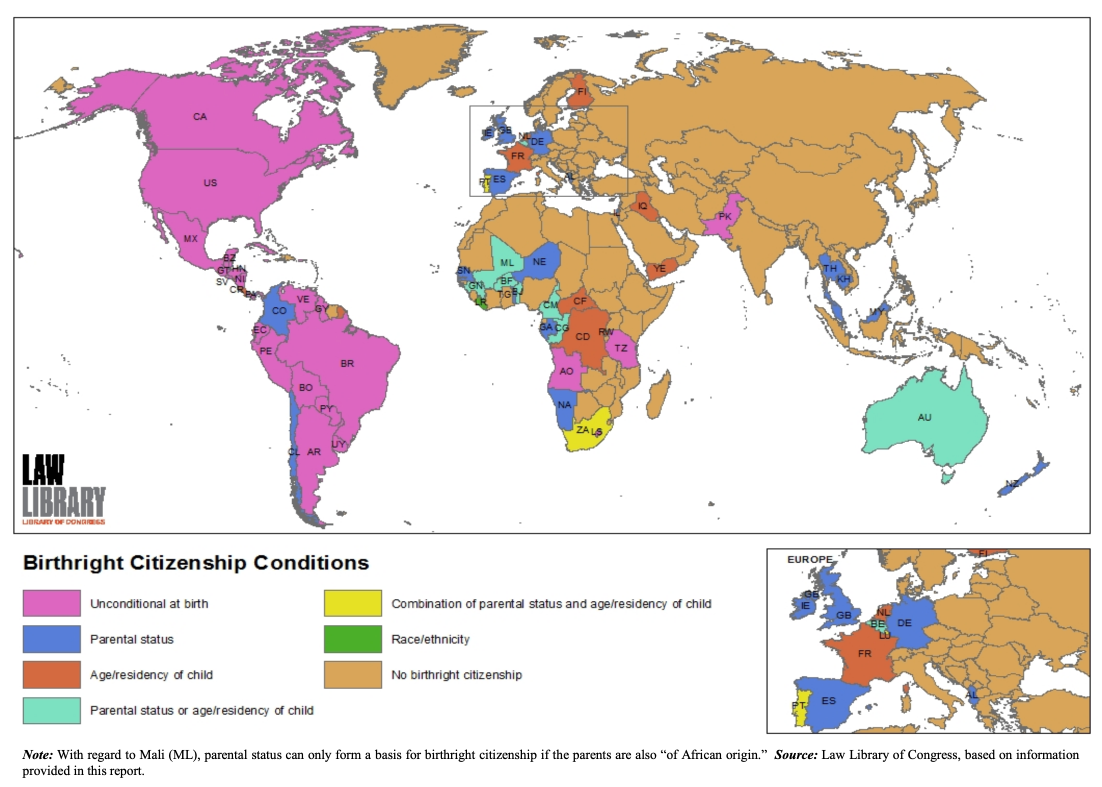 Source: The Law Library of Congress.
However, there is a caveat, NOT “everyone created equal” to enjoy this “right of the soil”, which was exactly Wong’s fate.
Source: The Law Library of Congress.
However, there is a caveat, NOT “everyone created equal” to enjoy this “right of the soil”, which was exactly Wong’s fate.The immigration history of Taishanese American
Taishanese (廣東台山) are the first Chinese people that had settled in the United States which oldest immigration record dated 1821[1] less than 50 years after America declared independence. They were the dominant work force building North America railways back in 19th century AND many of them died and buried under the railway.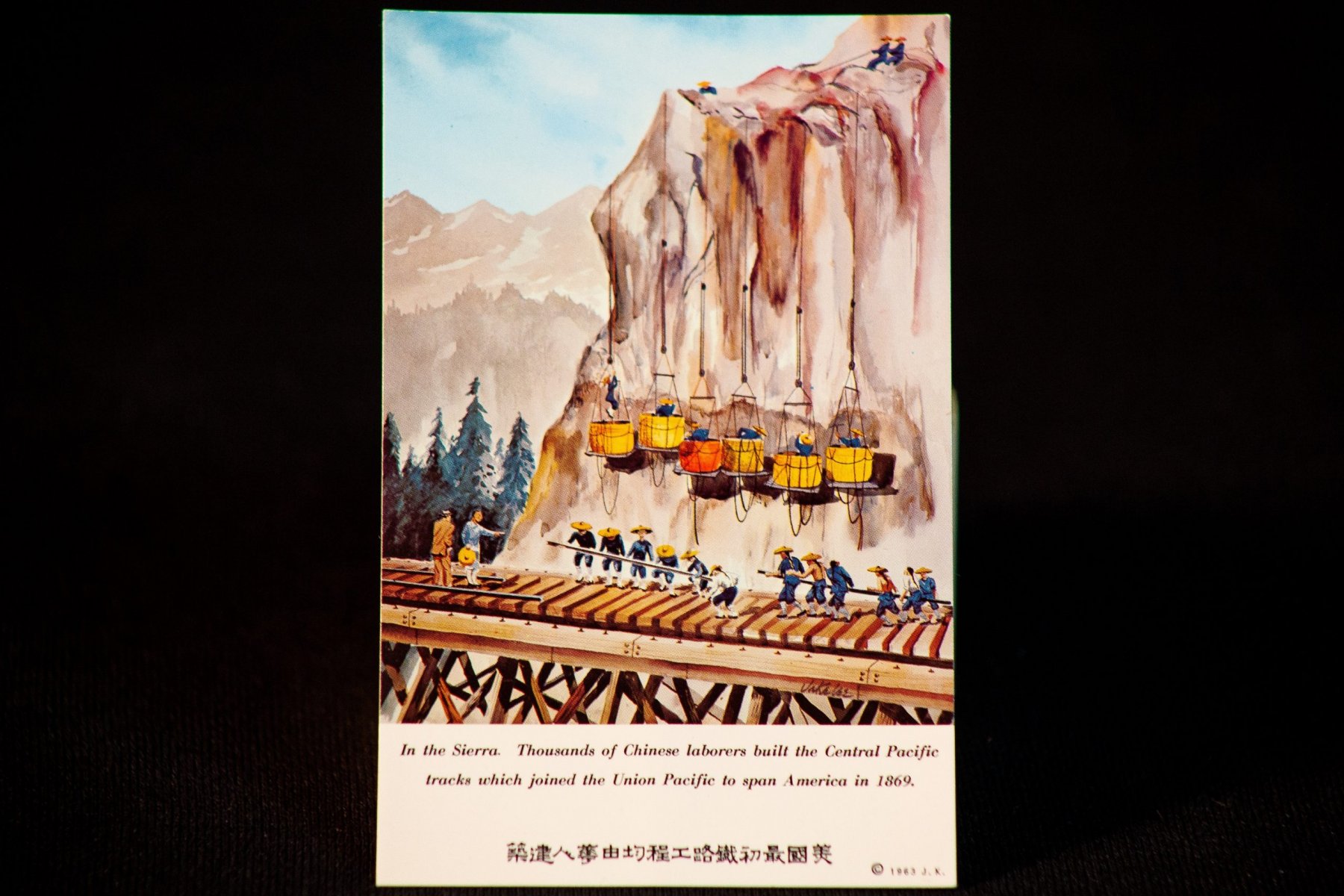 Source: Painting by Jake Lee: Building The Railroad
Source: Painting by Jake Lee: Building The Railroad
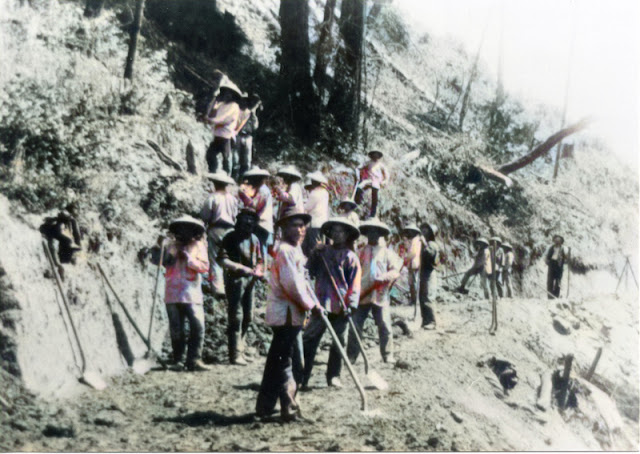 Source: Chinese crew carving out the Valencia Creek grade, 1886. [Aptos Museum – Colorized using DeOldify]
Among them are Wong’s parents, Wong Is Ping 黃四平 and his mother Wee Lee 李薇. They immigrated to San Francisco during the Gold Rush. Even after living in the United States for over 20 years when Wong Kim Ark was born in San Francisco, none of his parents were eligible to become citizens due to the notorious Chinese Exclusion Act of 1882. This act was only repealed in 1943, during World War II, when the United States and China became allies.
Source: Chinese crew carving out the Valencia Creek grade, 1886. [Aptos Museum – Colorized using DeOldify]
Among them are Wong’s parents, Wong Is Ping 黃四平 and his mother Wee Lee 李薇. They immigrated to San Francisco during the Gold Rush. Even after living in the United States for over 20 years when Wong Kim Ark was born in San Francisco, none of his parents were eligible to become citizens due to the notorious Chinese Exclusion Act of 1882. This act was only repealed in 1943, during World War II, when the United States and China became allies.
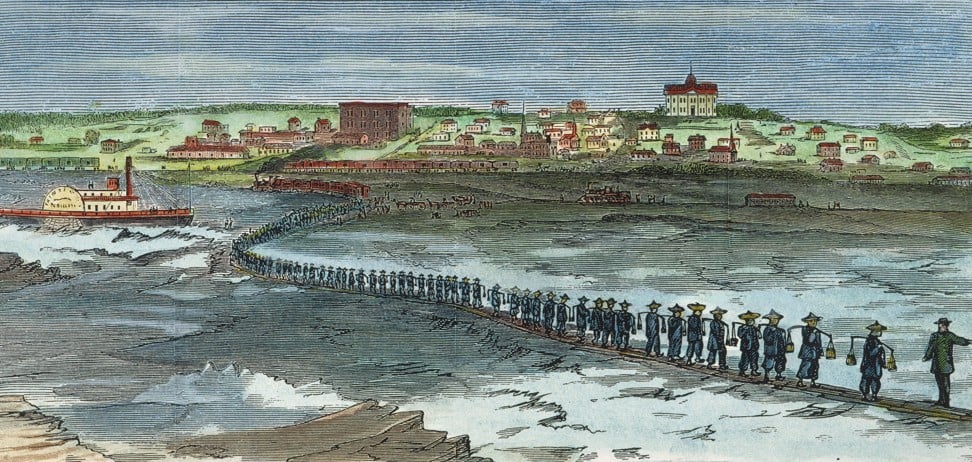 Source: Chinese labourers work on the transcontinental railroad crossing the Missouri River in Missouri (1870).
Source: Chinese labourers work on the transcontinental railroad crossing the Missouri River in Missouri (1870).Wong Kim Ark vs United States
Wong Kim Ark was born in San Francisco, California in 1873 (before the Chinese Exclusion Act).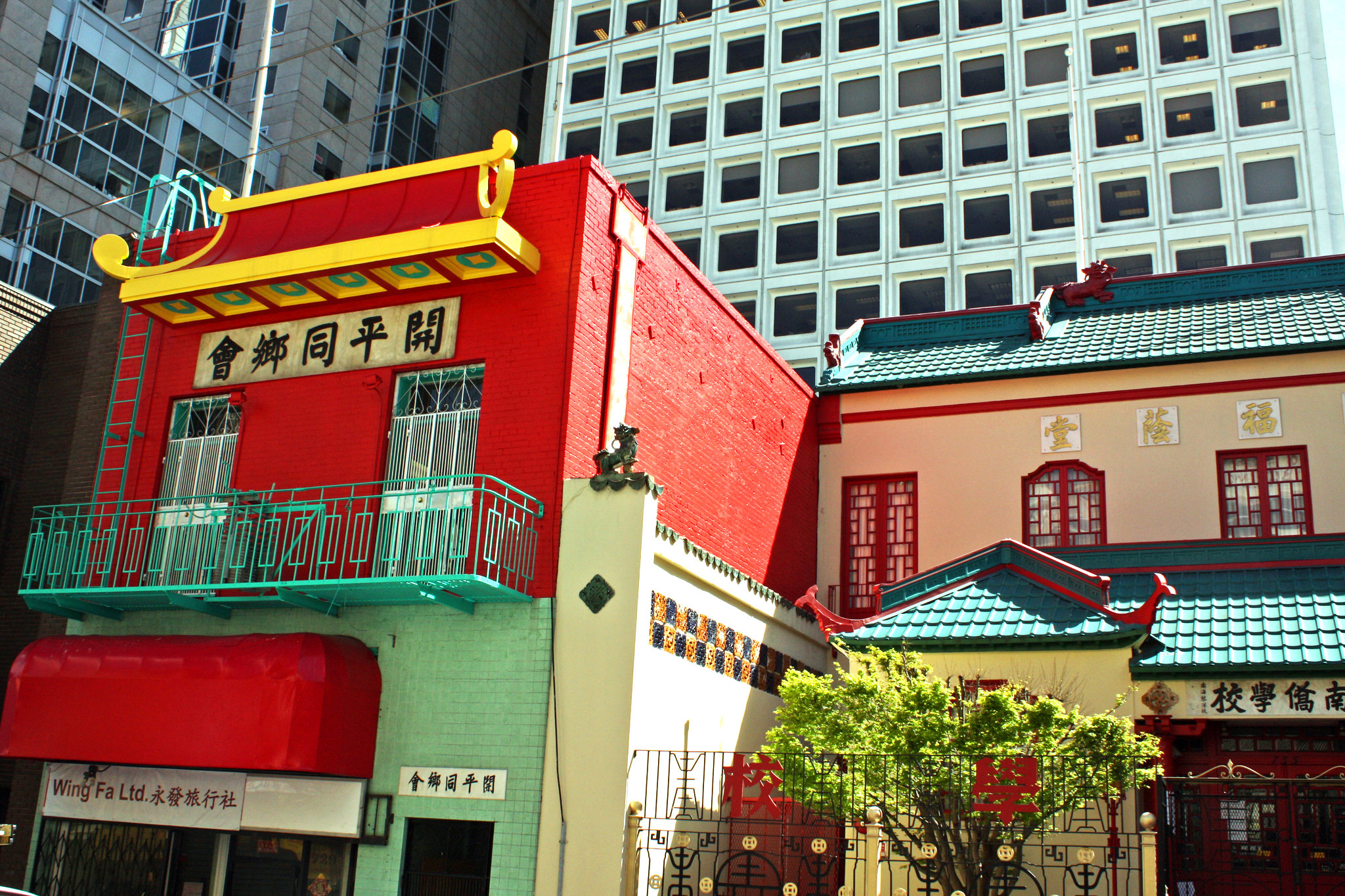 A picture of the former site of the birthplace of Wong Kim Ark credit to Far out City.
At Wong’s age 21, he took a trip to China to visit his parents. When he returned to the United States, he was denied entry on the ground, he spent 5 months on steamships off the coast of San Francisco while his case was being tried. With the assistance of legal representation by the Chinese Consolidated Benevolent Association 「中華會館」 and the San Francisco attorney George Collins, Wong Kim Ark challenged the refusal to recognize his birth claim to U.S. citizenship, and a petition for a writ of habeas corpus was filed on his behalf in federal district court. [2]
Even with a notarized statement by witness verifying Wong’s departure for returning to United States, an unnamed Bureau of Immigration official left a note in his file questioning the veracity of his claim of birth in the United States.
A picture of the former site of the birthplace of Wong Kim Ark credit to Far out City.
At Wong’s age 21, he took a trip to China to visit his parents. When he returned to the United States, he was denied entry on the ground, he spent 5 months on steamships off the coast of San Francisco while his case was being tried. With the assistance of legal representation by the Chinese Consolidated Benevolent Association 「中華會館」 and the San Francisco attorney George Collins, Wong Kim Ark challenged the refusal to recognize his birth claim to U.S. citizenship, and a petition for a writ of habeas corpus was filed on his behalf in federal district court. [2]
Even with a notarized statement by witness verifying Wong’s departure for returning to United States, an unnamed Bureau of Immigration official left a note in his file questioning the veracity of his claim of birth in the United States.
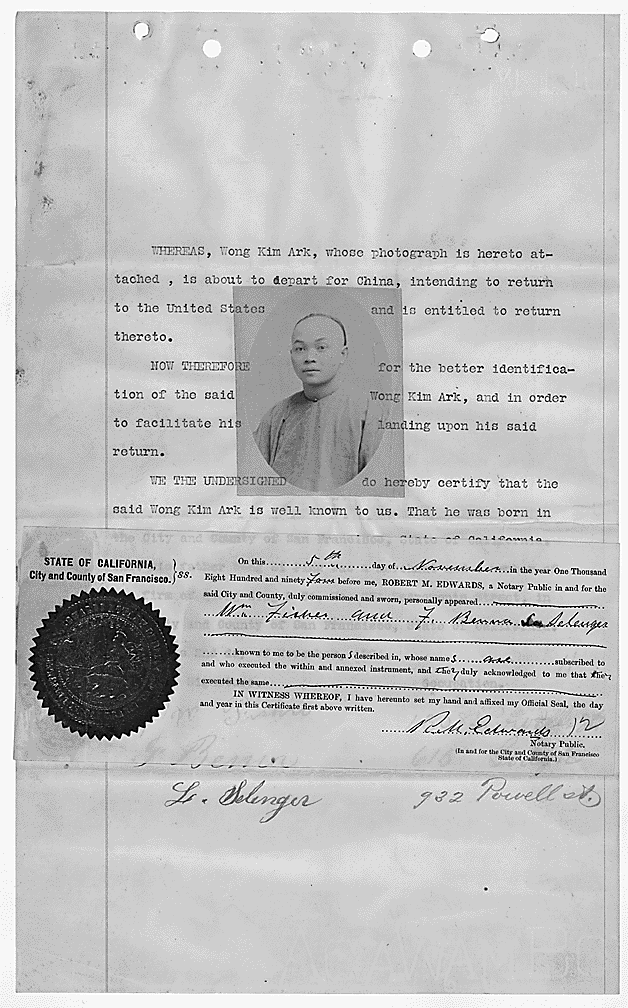 Wong’s attorney’s Thomas Riordan claim was “All persons born or naturalized in the United States, and subject to the jurisdiction thereof, are citizens of the United States and of the State wherein they reside.” Instead of challenging the discrimination exclusively to Chinese ONLY.
Eventually, on March 28, 1989, with a 6-2 decision, the Supreme Court held that Wong Kim Ark had acquired U.S. citizenship at birth and that "the American citizenship which Wong Kim Ark acquired by birth within the United States has not been lost or taken away by anything happening since his birth." The decision in this case “was of great importance, not just to Chinese Americans, but to all American citizens who had been born to alien parents.”
Additionally, it’s worth noting that Wong eventually returned to China because his wife and parents lived there. However, all of Wong’s sons immigrated to the United States and became citizens. Notably, Wong’s youngest son was drafted into the World War II and later made a career in the US Merchant Marine. To this day, Wong’s descendants in America continue to thrive.
Wong’s attorney’s Thomas Riordan claim was “All persons born or naturalized in the United States, and subject to the jurisdiction thereof, are citizens of the United States and of the State wherein they reside.” Instead of challenging the discrimination exclusively to Chinese ONLY.
Eventually, on March 28, 1989, with a 6-2 decision, the Supreme Court held that Wong Kim Ark had acquired U.S. citizenship at birth and that "the American citizenship which Wong Kim Ark acquired by birth within the United States has not been lost or taken away by anything happening since his birth." The decision in this case “was of great importance, not just to Chinese Americans, but to all American citizens who had been born to alien parents.”
Additionally, it’s worth noting that Wong eventually returned to China because his wife and parents lived there. However, all of Wong’s sons immigrated to the United States and became citizens. Notably, Wong’s youngest son was drafted into the World War II and later made a career in the US Merchant Marine. To this day, Wong’s descendants in America continue to thrive.
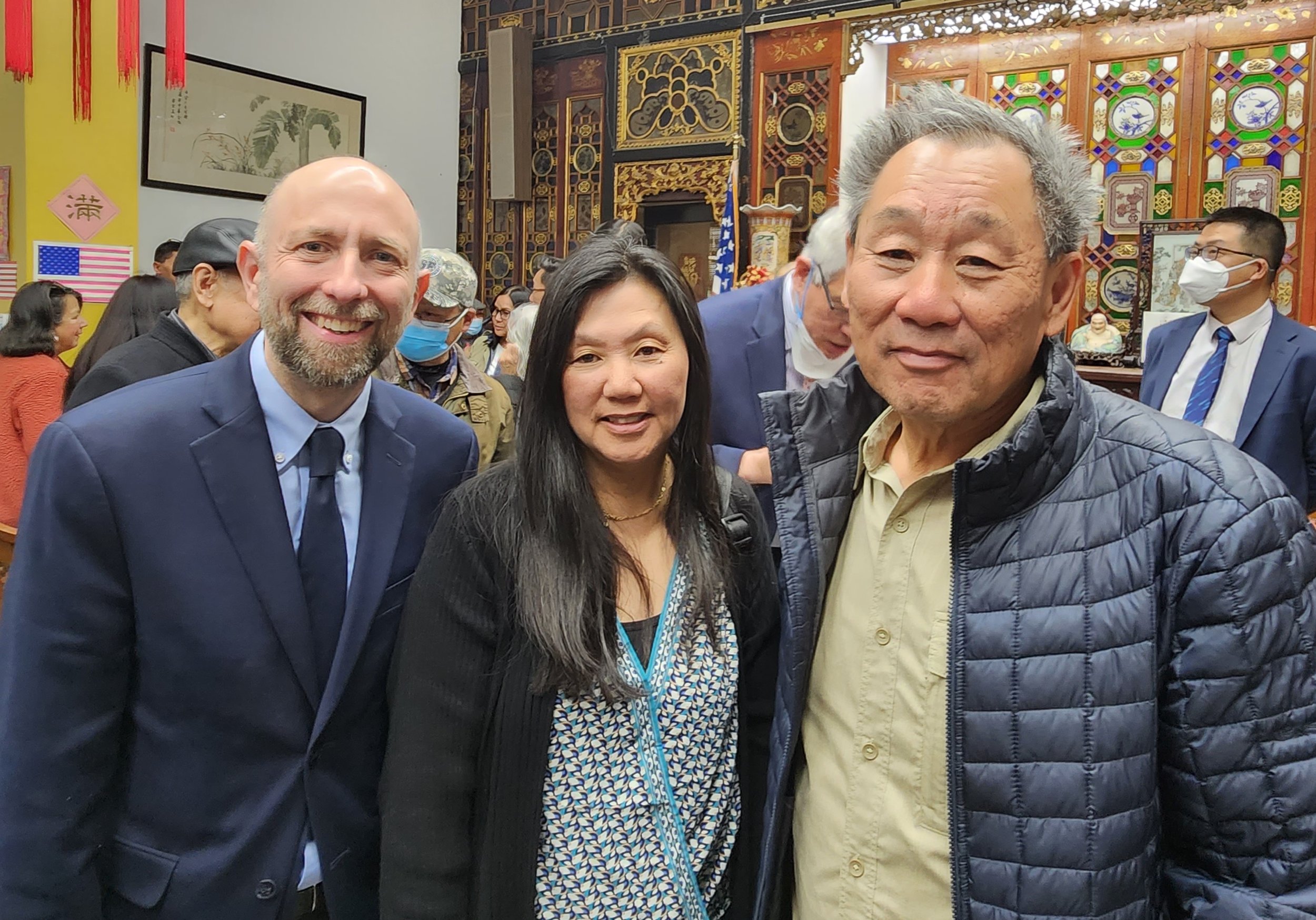 The Right and The Middle: descendants of Wong Kim Ark
The Right and The Middle: descendants of Wong Kim ArkImpact
Wong’s case significantly solidified the interpretation of the 14th Amendment’s Citizenship Clause, establishing that children born in the United States to immigrant parents, regardless of their ethnicity, are automatically considered citizens at birth, thus firmly establishing the principle of birthright citizenship in the U.S. lawFinal Thoughts
The United States are the best show of the humankind so in history! And Wong’s fight and the ruling was part of the greatness of American’s immigration history! I understand and admit there are loopholes in current immigration laws being exploited, however I’m against fixing a loophole by denying who we are through repealing the constitution! America is great, to achieve such greatness sometimes is hard! In US citizenship sworn ceremony, everyone taking the oath in front of a deity pledges to defend the constitution against both foreign and domestic enemies.Taishanese People are great! We, Americans are great! AND we choose the hard way! Because this is who we are!!!! The True MAGA! Thank you Wong Kim Ark

References
- Forgotten father of US birthright citizenship - YouTube
- Great-grandson of SF man who established birthright citizenship criticizes Trump's executive order - YouTube
- The fight for birthright citizenship in America - YouTube
- United States v. Wong Kim Ark | The Chinese Exclusion Act - YouTube
- Departure Statement of Wong Kim Ark, 1894 | National Archives
- Full article: Wong Kim Ark’s children: immigrant citizenship under Chinese exclusion
- 美国历史系列210:联邦政府诉黄金德案 - ShareAmerica
- 第339回:书生报国文章济世,黄金德出生公民权_美国
- How the modern Supreme Court might look at the 14th Amendment and birthright citizenship | CNN Politics